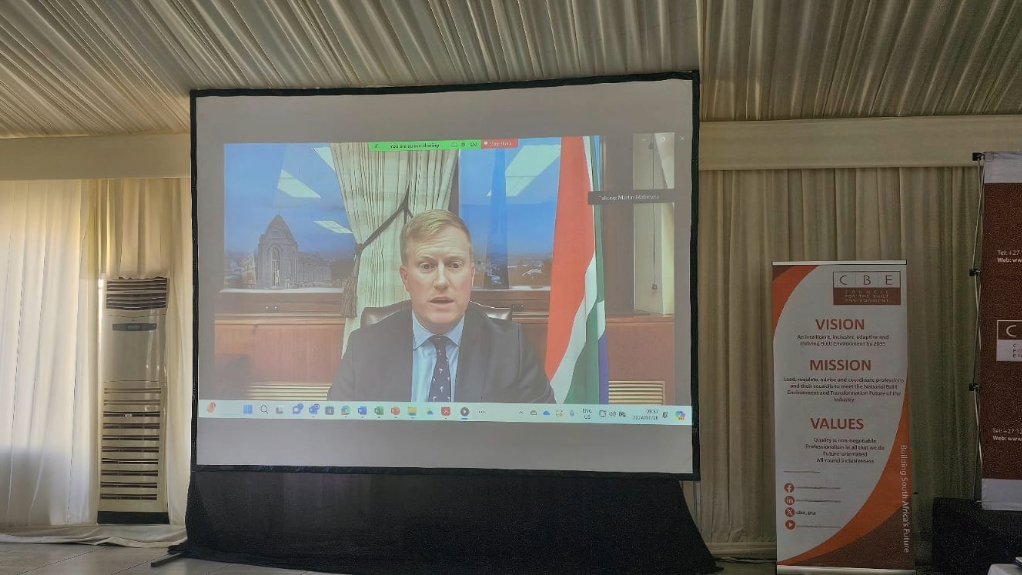CBE engagement underscores importance of collaboration to address issues in built environment sector


Public Works and Infrastructure Minister Dean Macpherson delivers his speech virtually
Government entity the Council for the Built Environment’s (CBE’s) Built Environment National Stakeholder Engagement, held last week in Pretoria under the theme ‘Past, Present, Future Mirror’, outlined issues facing the sector, and called for collaboration and other initiatives to address these, ensure the sustainability of the sector moving forward, and position it as a key enabler of job creation.
Public Works and Infrastructure Minister Dean Macpherson called for the CBE to consider how to use the construction industry to grow the country’s economy and create jobs, positing that it is ideally positioned to engender this owing to its low barriers to entry.
Moreover, he posited that collaboration with the private sector had the potential to bolster public-sector infrastructure. In this vein, he emphasised that the department is committed to simplifying regulations around public-private partnerships, and aims to work with the private sector to renovate the considerable amount of properties in its portfolio.
Macpherson stressed that expanding and capacitating Infrastructure South Africa to plan, coordinate and execute projects effectively would be a pivotal towards achieving collaboration.
He also highlighted the aim to work with the National Treasury to improve the financing and planning mechanisms of infrastructure development and construction in the country.
The department’s initiatives, under the new Government of National Unity, would also entail enhancing infrastructure development; promoting sustainability and resilience; advancing inclusivity; professionalising the public sector; and undertaking skills development and innovation.
Moreover, Macpherson emphasised that the department was endeavouring to address the construction mafia issue through a multi-faceted strategy, including enhanced security measures, legal action, stakeholder collaboration, regulatory oversight and community engagement.
The engagement included a presentation of the CBE’s 20-Year Review study, which encompasses insights into the current state and prospects of the built environment in the country.
The study affirmed that the CBE has a role to play in driving transformation in the industry, but that this must be based on empirical evidence and research.
It also called for skills development as a vehicle for transformation.
The study also emphasised the significance of collaboration, professionalisation and mentorship to engender sectoral transformation.
It highlighted the need to create opportunities for young people, especially those at a candidacy level.
The study also reinforced the CBE’s role as a guardian of the built environment profession in the country, but noted that this must entail collaboration.
Focus areas for the CBE moving forward, which take into account findings of the study, include strengthening the administrative excellence and financial sustainability of the entity; ensuring public protection; and improving the reputation of the sector.
The CBE will also endeavour to ensure that the sector has competent, capable and fit-for-purpose professionals. The importance of collaboration to achieve of all these initiatives was emphasised.
"We must lead the industry with a vision that is accepted by all and regulate with purpose, not just because we are given a mandate to do so, but with expertise. That's why we must focus on research and knowledge management and coordinate collectively the work we do," said CBE CEO Dr Msizi Myeza.
Presenting on the state of the built environment from an audit perspective was Auditor-General of South Africa deputy business unit leader Tintswalo Masia.
According to the findings, the country’s infrastructure is at the edge of collapse, evident by poor quality housing, several unoccupied State properties that are dilapidated, an inability to develop and maintain water infrastructure, vandalised road and rail infrastructure, and poorly maintained facilities to enable key service delivery.
Masia warned that the negative impact on the lived reality of South Africans was the most important story represented by the numbers, findings and audit outcomes.
Masia said that, in terms of infrastructure for service delivery, 137 projects were audited, and of this, 82% had one or more findings.
These findings included that 93 were delayed, 66 incurred cost overruns, 44 did not have the requisite level of quality of construction work and 13 of the completed infrastructure projects were not put into use within a reasonable time.
These failures were the result of inadequate coordination, collaboration and deliverables not synchronised in an ecosystem; failure to conduct proper needs assessment and feasibility study; a lack of accountability to implement action on non-performance of contractors/service providers; and inadequate monitoring and enforcement by regulatory bodies in infrastructure, Masia explained.
Therefore, she emphasised the need for accountability, effective resource management, intergovernmental planning, and coordination to address these issues.
Masia also advocated for professionalisation, improved reporting, and enforcement of accountability to transform the infrastructure sector.
Also, Masia indicated that the sector had 116 428 properties, but only performed condition assessments on 1 519 properties.
She pointed out that it therefore remained a concern that not all buildings would be subject to a conditional assessment every five years, as required, which resulted in funds being spent on reactive management that did not improve the overall condition of buildings.
However, Masia did mention that, positively, three student housing infrastructure projects were effectively planned and executed.
A panel discussion on professional skills and capacity building emphasised the need for a structured mentorship programme.
Department of Labour construction specialist Hilton Ganesen concluded the programme with insights on ensuring sustainability and promoting resilient infrastructure.
Article Enquiry
Email Article
Save Article
Feedback
To advertise email advertising@creamermedia.co.za or click here
Comments
Announcements
What's On
Subscribe to improve your user experience...
Option 1 (equivalent of R125 a month):
Receive a weekly copy of Creamer Media's Engineering News & Mining Weekly magazine
(print copy for those in South Africa and e-magazine for those outside of South Africa)
Receive daily email newsletters
Access to full search results
Access archive of magazine back copies
Access to Projects in Progress
Access to ONE Research Report of your choice in PDF format
Option 2 (equivalent of R375 a month):
All benefits from Option 1
PLUS
Access to Creamer Media's Research Channel Africa for ALL Research Reports, in PDF format, on various industrial and mining sectors
including Electricity; Water; Energy Transition; Hydrogen; Roads, Rail and Ports; Coal; Gold; Platinum; Battery Metals; etc.
Already a subscriber?
Forgotten your password?
Receive weekly copy of Creamer Media's Engineering News & Mining Weekly magazine (print copy for those in South Africa and e-magazine for those outside of South Africa)
➕
Recieve daily email newsletters
➕
Access to full search results
➕
Access archive of magazine back copies
➕
Access to Projects in Progress
➕
Access to ONE Research Report of your choice in PDF format
RESEARCH CHANNEL AFRICA
R4500 (equivalent of R375 a month)
SUBSCRIBEAll benefits from Option 1
➕
Access to Creamer Media's Research Channel Africa for ALL Research Reports on various industrial and mining sectors, in PDF format, including on:
Electricity
➕
Water
➕
Energy Transition
➕
Hydrogen
➕
Roads, Rail and Ports
➕
Coal
➕
Gold
➕
Platinum
➕
Battery Metals
➕
etc.
Receive all benefits from Option 1 or Option 2 delivered to numerous people at your company
➕
Multiple User names and Passwords for simultaneous log-ins
➕
Intranet integration access to all in your organisation


















